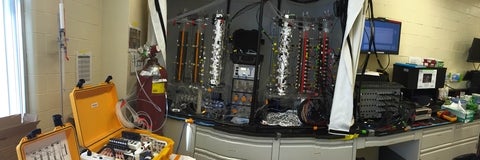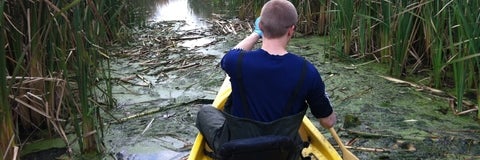Integrating Environmental Water Research Across Multi Scales and Disciplines
Water is our most precious natural resource. All human activities, from agriculture and industrial processes to domestic uses, depend on water of sufficient quantity and quality. This is also true for natural ecosystems. In contrast to highly visible water quantity stressors, such as flash floods and prolonged droughts, changes in water quality are often more gradual and more difficult to detect, and their cumulative impacts more difficult to predict and manage. Water quality deterioration, however, poses more pervasive and chronic risks to the economy, human health and the ecological life-support systems of the planet.
Water quality degradation is a global phenomenon. In Canada, for example, harmful and nuisance algal blooms are a persistent problem for many freshwater bodies, including the iconic Laurentian Great Lakes, while many of our First Nations communities still live under drinking water advisories. Globally, awareness is also growing that climate change adaptation must be an integral part of planning and implementing effective water management policies and practices.
For general inquires about the Ecohydrology Research Group, please email ecohydrology@uwaterloo.ca.
News
New paper analyzes the effects of flavins and siderophores on the oxidation of ferrous iron by molecular oxygen
The oxidation of Fe(II) plays an important role in the biogeochemical cycling of redox-sensitive elements and the fate and transport of pollutants in subsurface environments. In a joint study by researchers from ERG and China University of Geosciences, the kinetics of aqueous Fe(II) oxidation by O2 were measured at variable pH in the presence of riboflavin and desferrioxamine B as representative flavins and siderophores, respectively. The study closes important gaps in our understanding of the reaction mechanisms involved.
Microplastics Project: Official Funding Announcement
Ecohydrology's Philippe Van Cappellen and team have received a $1 Million dollar grant from Natural Sciences and Engineering Research Council of Canada’s (NSERC) and Environment and Climate Change Canada’s (ECCC) joint funding initiative on Plastics science for a cleaner future for their project: Microplastics Fingerprinting at the Watershed Scale: From Sources to Receivers.
Ecohydrology Research Presented at EGU 2021
Ecohydrology researchers presented virtually at this year's European Geosciences Union (EGU), which was held from April 19th to 30th. The following works have been presented:
A. Rafat, F. Rezanezhad, W. L. Quinton, E. R. Humphreys4, K. Webster, P. Van Cappellen. Predicting Non-growing Season Net Ecosystem Exchanges of CO2 from a Canadian Peatlands. Geophysical Research Abstracts, European Geosciences Union General Assembly, EGU21-3348, Gather Online, 19-30 April, 2021.



